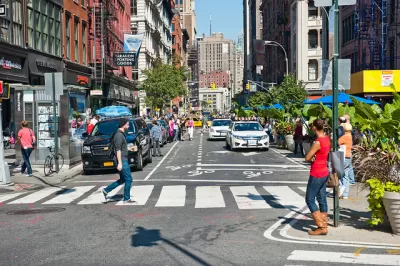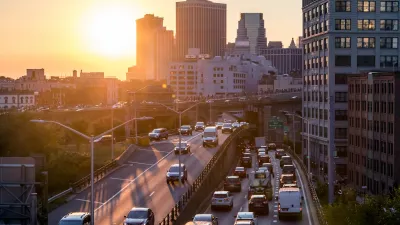Suddenly, after years of inaction, momentum is building for congestion pricing in New York City.

Eric Holthaus reports that New York Governor Andrew Cuomo supported the idea of congestion pricing during his "state of the state" address delivered earlier this week, as part of an "ambitious agenda" that would also ban platic bags and convert the state to carbon-emissions-free energy by 2040.
Holthaus, writing for Grist, obviously supports the idea of congestion pricing. Here's how the karticle lays out the case for the idea:
The idea of congestion pricing is simple: In a dense urban environment with great public transportation like lower Manhattan, operating a private passenger vehicle is actually harmful for society. Cars are dirty, loud, dangerous, and take up tons of space. If they get more expensive, fewer people will use them, carbon emissions will go down, and the streets will be safer — a win for everyone.
In May 2018, Grist also published a video explaining congestion pricing:
As for details of the congestion pricing plan, "Cuomo has proposed a $11.52 fee to limit vehicle traffic below 60th Street, and expects the plan to provide a “reliable funding stream” for public transit in the city, especially in underserved areas, raising $15 billion in an unspecified amount of time."
A similar congestion pricing plan famously died in the New York legislature in 2008. The idea has picked up momentum again recently as the city deals with worsening congestion and worsening transit performance.
FULL STORY: One more reason not to drive in New York (that could also save the planet)

Planetizen Federal Action Tracker
A weekly monitor of how Trump’s orders and actions are impacting planners and planning in America.

Restaurant Patios Were a Pandemic Win — Why Were They so Hard to Keep?
Social distancing requirements and changes in travel patterns prompted cities to pilot new uses for street and sidewalk space. Then it got complicated.

Map: Where Senate Republicans Want to Sell Your Public Lands
For public land advocates, the Senate Republicans’ proposal to sell millions of acres of public land in the West is “the biggest fight of their careers.”

Maui's Vacation Rental Debate Turns Ugly
Verbal attacks, misinformation campaigns and fistfights plague a high-stakes debate to convert thousands of vacation rentals into long-term housing.

San Francisco Suspends Traffic Calming Amidst Record Deaths
Citing “a challenging fiscal landscape,” the city will cease the program on the heels of 42 traffic deaths, including 24 pedestrians.

California Homeless Arrests, Citations Spike After Ruling
An investigation reveals that anti-homeless actions increased up to 500% after Grants Pass v. Johnson — even in cities claiming no policy change.
Urban Design for Planners 1: Software Tools
This six-course series explores essential urban design concepts using open source software and equips planners with the tools they need to participate fully in the urban design process.
Planning for Universal Design
Learn the tools for implementing Universal Design in planning regulations.
Heyer Gruel & Associates PA
JM Goldson LLC
Custer County Colorado
City of Camden Redevelopment Agency
City of Astoria
Transportation Research & Education Center (TREC) at Portland State University
Camden Redevelopment Agency
City of Claremont
Municipality of Princeton (NJ)





























